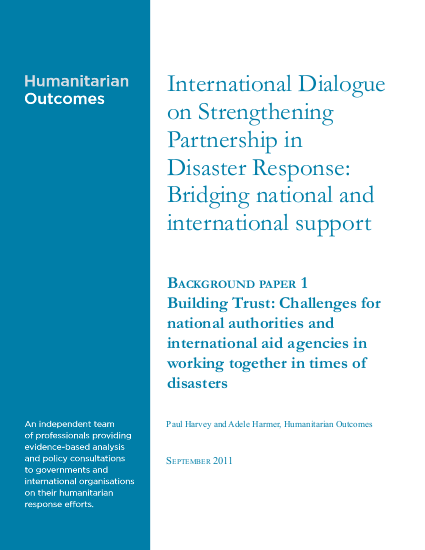Background paper 1: Building trust: challenges for national authorities and international aid agencies in working together in times of disasters

Questions of coordination and facilitation of international assistance to respond to natural disasters have long challenged the international community. As far back as the 1920s, international actors at the League of Nations sought to create mechanisms to facilitate smoother cooperation between states and with humanitarian organisations in disaster settings. Over the years and particularly in the last two decades, the number and diversity of international actors becoming directly involved in operations after major disasters has grown. International humanitarian aid presents a growing challenge to states affected by disasters, which need to decide when international assistance is most needed and how to coordinate with and regulate it when it is deployed.
The issue of the affected state in emergency response is rising higher on the forefront of inter-governmental and agency agendas in recent years, but there remain systemic challenges regarding how the affected state and international assistance actors work together during international response efforts. A report on the role of the state in 2009 characterised the relationships between governments and international humanitarian actors as too often ‘dysfunctional’ (Harvey 2009).
Governments continue to have concerns that international humanitarian actors demonstrate insufficient respect for the sovereign responsibility of states to respond to disasters themselves. Evaluations of international humanitarian aid continue to highlight the tendency of international actors to ignore, sideline or undermine national capacities for disaster response. Some governments continue to neglect their own responsibilities to protect and assist their citizens in times of disaster and many have yet to develop comprehensive procedures for facilitating and overseeing incoming assistance.
High-profile and large-scale disasters continue to attract a huge influx of thousands of non-governmental organisations and offers of assistance that are difficult for affected states to coordinate. There is ongoing evidence of inexperienced actors importing inappropriate ‘relief ’ items or failing to coordinate adequately with local authorities and international mechanisms. The ‘wrong aid’ is not only a waste of time and money – it can block the ‘right aid’ from finding its way to those in need.
However, a description of the problems facing governments in dealing with international assistance needs to be balanced with due recognition of the benefits and opportunities of international aid. Outside assistance can play an important role in meeting the needs of disaster affected populations when national and local capacities have been overwhelmed. It can save lives, maintain livelihoods and support recovery. International humanitarian aid represents a creative and agile force of people and resources from various parts of the world expressing the kind of human solidarity that underpins the humanitarian ideal.
Framing relations between national and international actors solely in negative terms is wrong. International aid agencies are committed in principle, in their policies and often in practice to supporting and working effectively with national authorities. In some contexts, international actors can strengthen national capacities for responding to disasters, coordinate and work effectively with local authorities in responding to disasters and build effective working relationships. In Mozambique, for instance, praise for the government’s response to floods in 2007 was widespread, and the role of the official body responsible for disasters, the National Institute of Disaster Management (INGC), was seen as particularly effective. International donors, who helped fund the employment and training of 285 staff and the equipping of a national headquarters and several regional offices, strongly supported the creation of the INGC (Foley 2007).
